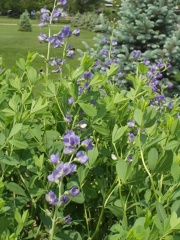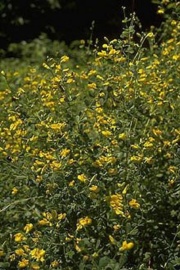Difference between revisions of "Baptisia"
Jump to navigation
Jump to search
(username removed) |
|||
| (4 intermediate revisions by 3 users not shown) | |||
| Line 1: | Line 1: | ||
| − | [[File:baptisaAustralisS.jpg|thumb|Perennial baptisia | + | [[File:baptisaAustralisS.jpg|thumb|Perennial baptisia ''Baptisia australis'']] |
| − | |||
| − | ''Baptisia australis'']] | ||
== Description == | == Description == | ||
| − | A pale green dye produced from the leaves and blue flowers of ''Baptisia australis''. This medium size perennial herb from the pea family is native to the central and eastern United States. The leaves and flowers can be boiled in water to produce a green dye with [ | + | A pale green dye produced from the leaves and blue flowers of ''Baptisia australis''. This medium size perennial herb from the pea family is native to the central and eastern United States. The leaves and flowers can be boiled in water to produce a green dye with [[aluminum]] or orange dye with [[chromium|chrome]]. A dark green is obtained with [[iron]]. Baptisia dye contains flavones (spartein, [[luteolin]], apigenin), [[flavonol|flavonols]] and [[indigotin|indican]]. A similar plant called [[false indigo]] (''Baptisia tinctoria'') is in the same family. |
| − | [[File:baptisiatinctoriPD1.jpg|thumb|Horseflyweed | + | [[File:baptisiatinctoriPD1.jpg|thumb|Horseflyweed ''Baptisia tinctoria'']] |
| − | |||
== Synonyms and Related Terms == | == Synonyms and Related Terms == | ||
| Line 19: | Line 16: | ||
</gallery> | </gallery> | ||
| + | ==Resources and Citations== | ||
| − | + | * John and Margaret Cannon, ''Dye Plants and Dyeing'', Herbert Press, London, 1994 | |
| − | |||
| − | * | ||
* ''The Merck Index'', Martha Windholz (ed.), Merck Research Labs, Rahway NJ, 10th edition, 1983 Comment: p. 985 | * ''The Merck Index'', Martha Windholz (ed.), Merck Research Labs, Rahway NJ, 10th edition, 1983 Comment: p. 985 | ||
Latest revision as of 08:40, 2 May 2022
Description
A pale green dye produced from the leaves and blue flowers of Baptisia australis. This medium size perennial herb from the pea family is native to the central and eastern United States. The leaves and flowers can be boiled in water to produce a green dye with Aluminum or orange dye with chrome. A dark green is obtained with Iron. Baptisia dye contains flavones (spartein, Luteolin, apigenin), flavonols and indican. A similar plant called False indigo (Baptisia tinctoria) is in the same family.
Synonyms and Related Terms
Baptisia australis (wild blue indigo); Baptisia tinctoria (false indigo); indaco selvatico (It.); yellow indigo; rattle flower;
Additional Images
Resources and Citations
- John and Margaret Cannon, Dye Plants and Dyeing, Herbert Press, London, 1994
- The Merck Index, Martha Windholz (ed.), Merck Research Labs, Rahway NJ, 10th edition, 1983 Comment: p. 985


